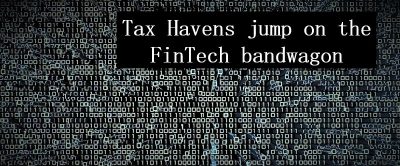Financial + Technology: Fintech, Hotbed of Offshore Deregulation and Crime

Note to readers: please click the share buttons above
Reuters has just published an article titled Swiss watchdog to propose looser anti-money laundering rules for fintechs. (Fintech is short for “financial + technology” and it is about bringing technology into the financial sector. Switzerland’s move is, apparently:
part of a drive to boost innovation and shore up the country’s position as a leading money management hub.”
For the appropriate context for this, see a recent FT Alphaville column entitled Fintech as a gateway for criminal enterprise. It focuses on money transmission services, but it’s part of an Alphaville series examining the dark side of fintech, which is disturbingly large.
Equally disturbing, tax havens are rapidly jumping on the Fintech bandwagon. Jersey has set up a “regulatory sandbox” to allow certain startups to operate “without the normal registration requirements and associated costs.” The Isle of Man, another tax havens, has “thrown its arms wide open” to cryptocurrencies. In the words of Appleby, the star of the Paradise Papers:
The Isle of Man Government appears keen not to suffocate this evolving area with onerous regulation.”
If that doesn’t set the warning lights flashing take a look at sleazier tax havens, like Malta, which is a “hotbed for fintech: and which has dived in with “Bitcoin ATMs.” Or try the Russian enclave and “Special Economic Zone” of Kaliningrad, where participants enthuse that
Whatever is not illegal is legal . . . there are no laws regarding cryptocurrency mining because it’s a new kind of business.”
And that gets to the nub of the issue with fintech. It is racing ahead of regulatory protections for consumers and wider society — and that can be a highly profitable place to be. Which is why it is so compatible with the offshore tax haven model: these places are in the business of offering escape routes from the rules. As one of the boosters of this technology puts it — a booster with the fitting name of ‘escape artist’ — Cryptocurrency Is The New Tax Haven.
The word “crypto” should offer a clue — in this case, secrecy. Bitcoin, the best know of these currencies, is not just a vehicle for secrecy and crime, but also a way for those running the system to abuse millions of poor mugs who thought they could get rich by buying into this once in a lifetime opportunity (a “fraud worse than tulip bulbs,” as a top banker put it.)
There’s a sucker born every second
And there’s this:
According to a working paper from the University of Luxembourg, lesser-known hubs like the British Virgin Islands, Gibraltar, and the Cayman Islands now count among the world’s top ten ICO [Initial Coin Offering] destinations, owing to their ease-of-ICO administration, laws, and tax benefits.”
Having made a business model of racing ahead of regulations, the best way to stay ahead is to be regulated in a tax havens.
For a dose of sanity on fintech, there’s plenty more here.


